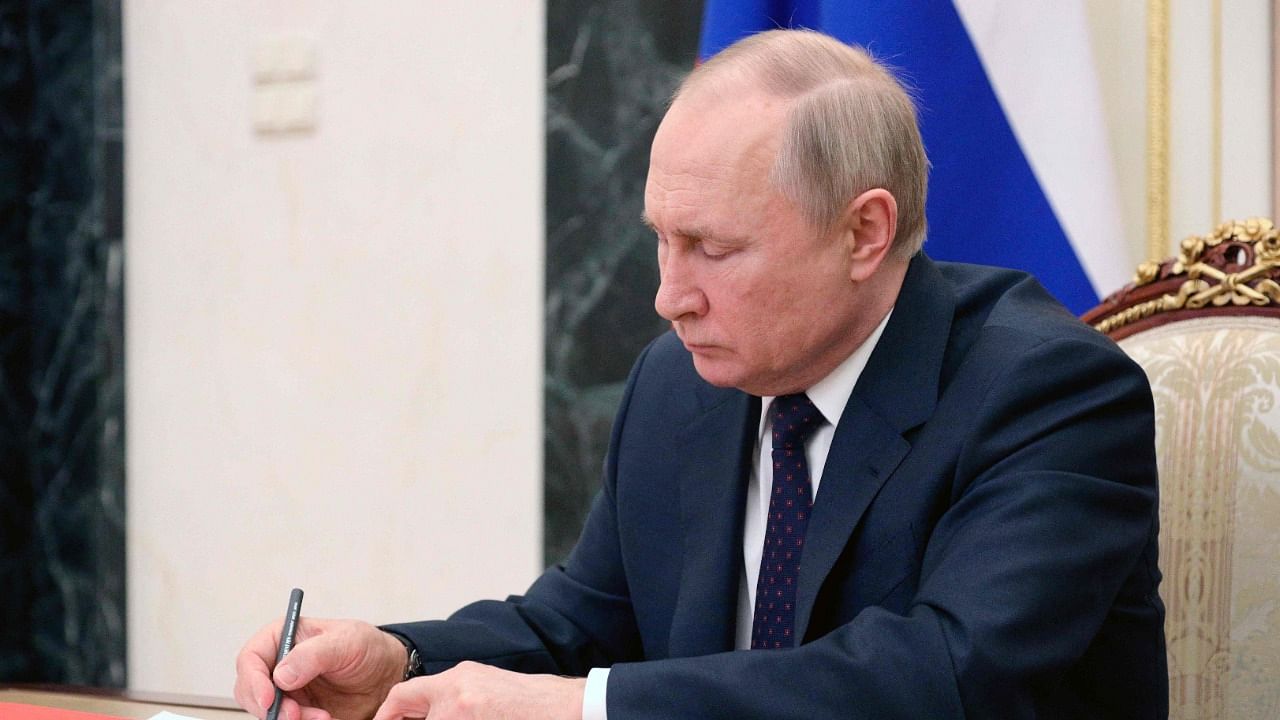
It is a truism to say that interstate wars and conflicts are multi-dimensional by nature. The Russian invasion of Ukraine – the climax of the Russo-Ukrainian war ongoing since 2014 – is no exception. And yet, nine months into the invasion, the Indian media still pays disproportionate attention to its geopolitical aspects, such as the ostensible great power rivalry between the West and Russia, the role of NATO, or the threat of nuclear escalation.
As the media has framed the conflict in Manichean geopolitical terms, other important aspects and contradictions have receded into the background. These include Ukrainian nationalism, Russian imperialism and neo-colonialism, the divisions within the Ukrainian society following the 2014 Maidan Revolution, the shared history of the two states and, of course, the personality and worldview of Russia’s President Vladimir Putin.
National interests are not given. Nor is history or even geography. Security concerns do not emerge in a vacuum. Putin famously said that the collapse of the Soviet Union was one of the greatest geopolitical catastrophes. What is less quoted, however, is what he said immediately after that phrase. In his annual state of the nation address to parliament, Putin said: “As for the Russian people, it became a genuine tragedy. Tens of millions of our fellow citizens and countrymen found themselves beyond the fringes of Russian territory.”
This is exactly why the ongoing war is a “special military operation”, according to Russian propagandists. But, can there be a war between “fellow citizens”?
In this regard, Putin’s 2021 article “On the Historical Unity of Russians and Ukrainians” helps to illuminate his logic further. Three core inter-related themes come to the fore in the essay: common historical legacy, the unity of two peoples, and “project anti-Russia.”
Firstly, Putin traces the sources of Russian, Ukrainian, and Belarusian identities from Kyivan Rus to the Cossacks, to the Polish-Lithuanian Commonwealth, to the Austro-Hungarian Empire, to the Russian Empire, to the Soviet Union, and finally to the post-independence (of former Soviet territories) period. What is distinct about his quasi-historical narrative, however, is the acrimonious style and discontent with the alleged historical injustices toward Russia. Thus, the Polish rulers and ideologues cultivated Ukrainian nationalism to create an “anti-Moscow Russia”; Austria-Hungary “mercilessly exploited historical Russian lands”; and the German Nazis only needed Ukraine as a source of living space and slaves.
Yet, no “living space” is left for Ukraine’s political subjectivity in the essay, as the country is constantly depicted as inseparable from the Russian State.
Secondly, Putin is adamant in the essay that Russians and Ukrainians are bound by “cultural, spiritual and economic” history. He repeatedly uses such words as “common”, “single”, “shared” (history, language, Orthodox faith), “ties” and “unity.” In one of the opening paragraphs, he refers to “essentially the same historical and spiritual space,” the dissolution of which is a “great common misfortune and tragedy.” The theme of a “single people”, then, is a key thread which binds everything together and serves to validate Russia’s foreign policy.
Thirdly, and most strikingly, Putin insists that the recent wall between Russia and Ukraine is a product of “divide and rule” strategy. “These are…deliberate efforts by those forces that have always sought to undermine our unity,” Putin says. The key word which keeps reoccurring in the essay is “anti-Russia”, taking the variants of “external forces” (controlling Ukraine), “ill-wishers” (trying to weaken Russia), “a springboard against Russia” (Ukraine) or “external patrons and masters” (of Ukraine).
The logic is as blunt as it is absurd: since the Ukrainians and Russians are “one people”, the alleged control of Ukraine by the West is a direct and existential threat to Russia. It is telling that Putin rarely talks about NATO (mentioned only twice in the essay) and when he does, it is only in the larger context of the “direct external control” of Ukraine.
What glues together these three major themes in the essay is Putin’s insatiable and paranoid deployment of historical symbols, parallels, and analogies to identify the collective West as Russia’s significant Other. On one occasion, aiming to draw an instructive parallel for “those who have today given up the full control of Ukraine to external forces,” Putin recalls that in 1919, the Central Council of Ukraine was “essentially under German protectorate.” On another occasion, he blames the Bolsheviks for their efforts to “detach from Russia its historical territories.” And on another one, he insists that the “anti-Russia” project was started way back in the 17th century by the Polish-Lithuanian Commonwealth in order to weaken Russia.
History, then, is repeatedly interpreted as the cyclical, archetypical, and sacred struggle between Russia and the Western forces that seek to dismantle its Statehood – be it Polish rulers, German Nazis, or American liberals.
Let me also draw on historical reasoning in conclusion, though “lessons of history” at war can be misleading, as International Relations scholar Yuen Foong Khong reminds us. At the beginning of the invasion, Putin had attempted to legitimise it through the discourse of “denazification,” tapping into the myth of the heroic Soviet people fighting the Nazis. Ironically, the roles have reversed, and it is the Ukrainian people (who don’t exist, according to Putin) who have shown courage, resistance, and resilience.
Not less importantly, 75 years ago, India, a country that I greatly respect and admire, declared independence from its coloniser, the British Empire. Ukraine’s anti-colonial struggle against the spectre of the Russian empire is the essence of the current war. The war in which my country seeks liberation, rather than abstract peace. The birth of a new nation is happening right in front of our eyes. Perhaps, in the very long run, the grand historian Putin might be thanked for that.
(The writer is an Associate Professor of Political Science, Jindal School of International Affairs, O P Jindal Global University)